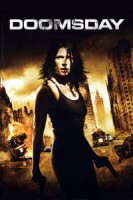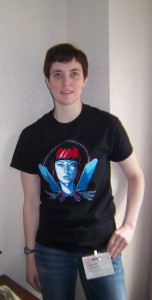Too Niche – Lauren Jankowski
“Like most asexuals, I spent a good portion of my life feeling broken.”
That’s the very first line of Lauren Jankowski‘s guest blog post. Think about that for a minute. Think about being one of those 1 in 100 people growing up with that message.
And it’s not even a lack of representation, exactly; it’s selective representation. Heroes have to have a romantic storyline. Villains, not so much.
Just let that sink in…
Like most asexuals, I spent a good portion of my life feeling broken. While watching a movie or devouring the fantasy novels I loved, I felt more like the villain than the hero. Not in philosophy or beliefs or actions, but being alone and not experiencing the same desires as heroes often do. The hero’s happily-ever-after almost always involves settling down with another person. Even if they fail to achieve that ending, the audience is made to root for that outcome. You read about the chemistry or sexual tension between characters. As a society, we’re made to want that happy ending: marriage, 2.5 kids, and an overall blissful family.
What about the archetypal villain? They tend to be alone (sometimes widowed, sometimes just because). Oh sure, they occasionally have henchmen, but more often than not, they’re isolated. Their arc tends to be opposite the hero’s, probably because their desires are meant to run counter. They don’t want people or family. They want power and control. This is especially true of women villains: just think of almost any Disney villainess.
Imagine being a teenager and everyone around you is sorting out their identities, discovering new labels and desires, and connecting with a community of people who share this label. Gay, straight, bi, or trans. Some of these terms are used in sex education, and all of them are found in U.S. popular culture. Learning these labels helps people discover who they are.
Now, imagine you don’t fit into any of these labels. You don’t fit into any of these communities. Imagine you can’t find a label for what you feel, your identity, because it doesn’t exist as far as you know. Imagine people telling you who you are, telling you that you’re going to fit into one of these groups eventually. Imagine that never happens.
That was the situation I found myself in: I was perfectly content with platonic friendships but experienced no sexual or romantic desire. Not even the typical crush teenagers are expected to have. Everyone around me was pairing up, diving into relationships, and I was left feeling rather confused.
I turned to the fantasy novels I loved so much only to have them suddenly fail me. I searched desperately, often late into the night, my eyes and fingers darting over the tiny black print. “Please,” I would silently plea. “I don’t want to be alone. There must be someone like me. Someone who isn’t broken, twisted, and evil.”
There wasn’t, at least not any women. Every now and again, there would be an old white man who seemed to not experience any attraction (Tolkien’s Istari, Lloyd Alexander’s wizard, etc.). The few women found in these pages were either in a romantic relationship or evil. I was alone.
On a whim, I revisited some ancient myths and I found her. A woman who had always been there, but one who I hadn’t realized would become so important to me in the future. Artemis, the Greek goddess of the hunt, a woman who went out of her way to remain unattached. This powerful goddess specifically demanded that she not be romantically involved with any man. And Zeus, the King of the gods, agreed! He didn’t protest or suggest that perhaps she just “hadn’t found the right one.” He basically said, “Yeah, sure” and let her do her own thing. At last, a powerful woman who, like me, didn’t appear to experience sexual or romantic desire and was perfectly fine with that. There was hope!
The years went by and I continued to search through modern fantasy for a fellow asexual woman, even before I had the term for my orientation. Books blended together and my search continued to be fruitless. There just weren’t any modern asexual women in fantasy. Whenever I got frustrated with what seemed to be a pointless search, I always returned to stories about Artemis. Yeah, she did some pretty horrible things, but she was a goddess. All deities had their petty and vindictive moments.
 And then I found Eden Sinclair in the movie Doomsday. Imagine my shock, sitting in a theater, watching a woman kick so much ass and experience little to no attraction to other characters in her story. She wasn’t evil, she wasn’t a villain. Sinclair was a tough-as-nails soldier who was there to get a job done. And she was an interesting character: an orphan (an adoptee like me), someone who was a mystery. Sinclair kept a cool head in hostile territory and outsmarted every opponent she encountered. There wasn’t a large audience in the theater, but I looked around anyway, curious what my fellow movie-goers thought.
And then I found Eden Sinclair in the movie Doomsday. Imagine my shock, sitting in a theater, watching a woman kick so much ass and experience little to no attraction to other characters in her story. She wasn’t evil, she wasn’t a villain. Sinclair was a tough-as-nails soldier who was there to get a job done. And she was an interesting character: an orphan (an adoptee like me), someone who was a mystery. Sinclair kept a cool head in hostile territory and outsmarted every opponent she encountered. There wasn’t a large audience in the theater, but I looked around anyway, curious what my fellow movie-goers thought.
I’ll never forget the feeling that bloomed in my chest when I saw how riveted the few people in the audience were. They were rooting for her. They were rooting for someone who was like me. It didn’t matter that she never flirted with the other characters. It didn’t matter that she was an archetypal lone wolf. She was a badass and the audience loved her for it. I think I may be the only person who got misty-eyed during Doomsday, a post-apocalyptic horror film with copious amounts of gore and violence.
As asexual visibility has gradually begun to form into a movement, there has been a predictable backlash. In genre, many creators have dug in their heels to resist the idea that so small a group needs representation. Whether it’s Stephen Moffat declaring Sherlock Holmes can’t be asexual because he’s too interesting, or the literary agent who told me “asexuality is too niche to move books,” ace phobia and the erasure of asexual voices and characters continues in genre.
When I came out as asexual, I decided to be as open as I could. I would wear my label proudly because it was who I was. Being naturally quiet and introverted by nature, this was a bit intimidating. Then I thought of other girls like me: alone and scared, desperately paging through the stories they loved in the hopes of finding someone like them and being disappointed.
Nobody deserves to feel alone or broken or invisible. People should never be labeled as too niche. Asexuals can be interesting and heroic and adventurous too.
Lauren Jankowski is an aromantic asexual fantasy author and a passionate genre feminist from Illinois. She’s the founder of Asexual Artists (on Tumblr and WordPress), a site dedicated to highlighting the work of asexual-identifying artists in all mediums. Author of the ongoing series The Shape Shifter Chronicles (Sere from the Green, Through Storm and Night, From the Ashes, Haunted by the Keres), she specializes in strong heroines and hopes to bring more badass women (including ace women) to the fantasy genre. She’s also still very much platonically enamored with Artemis.






